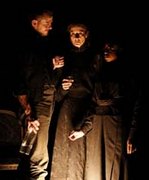SITE GUIDE
SEARCH
REVIEWS
REVIEW ARCHIVES
ADVERTISING AT CURTAINUP
FEATURES
NEWS
Etcetera and
Short Term Listings
LISTINGS
Broadway
Off-Broadway
NYC Restaurants
BOOKS and CDs
OTHER PLACES
Berkshires
London
California
New Jersey
DC
Philadelphia
Elsewhere
QUOTES
TKTS
PLAYWRIGHTS' ALBUMS
LETTERS TO EDITOR
FILM
LINKS
MISCELLANEOUS
Free Updates
Masthead
A CurtainUp Review
Neva
| "How dare you stop the scene when the scene's just begun? The one who is mocking us is you. Do you take me for a clown? Am I your fool? How can you even think of stopping a scene when the scene's already started? A little respect, please. And not only do you disrespect me, the stage, the theater, you also disrespect your partner, who was absolutely concentrated on the scene. And then you stare at me surprised when I tell you you have no soul." — Olga, to Masha |

Luke Robertson, Bianca Amato, and Quincy Tyler Bernstine. Photo credit: Carol Rosegg
|
It's 1905 in St. Petersburg, and workers are being massacred in the streets. Yet, Olga knows nothing of that. Like a self-absorbed teen fantasizing about the gnashing of teeth at her own funeral, Olga declares that she's too fragile, too soul-sick, too oppressed to carry on. But, even though she predicts that she'll be unjustly savaged by the critics and the audience, she'll go on! Yet, Olga, played often stunningly by Bianca Amato, is much more complex than a practitioner of simple self-absorption. She knows she's self-absorbed, and even that observation bores her, so we watch her analyze herself as if in a hall of mirrors.
And what a small hall of mirrors this is! Olga and her actor colleagues, Masha (Quincy Tyler Bernstine) and Aleko (Luke Robertson) are confined to a tiny elevated stage that barely fits all three of them, and Olga is hogging the space. Calderón's Olga is in love with herself, with the very idea of herself. She's so far removed from authentic feeling that she asks Masha and Aleko to act out her husband's death for her! This is pathetic yet risible; humor in Neva is incongruous and startling. Olga and Aleko are full of themselves. Yet, there is a revolution taking place in the streets- outside of the very theater in which they indulge themselves.
As in Jean-Paul Sartre's No Exit, the characters in Neva are stuck with each other. As Olga hurls insults at the under-confident Masha, Masha --who is becoming attuned to what's happening in the streets, and who has already participated, in a way, in the revolution--slowly gains her confidence by acting out scenes that dismantle her irritant, and ultimately proves herself the more authentic being. Though a bit sudden at play's end, Masha's breathless soliloquy, a tour de force from Ms. Bernstine, breaks the masturbatory orgy of the actors' self-regard. It's a solemn renunciation of her own complacency and of those who would hide their heads in the sands of theater, when they could and, in her opinion should, be out in the streets, fighting. It's not at all clear whether Mr. Calderón wholly shares Masha's passionate yet extreme viewpoint, and this ambiguity serves to fuel the play's tension.
In Neva's design, simplicity wins the day. Susan Hilferty's costuming is serviceable and plain, and Calderón and company do so much with a small light at the foot of the tiny stage that one realizes that moving theater can be made anywhere - even on a small, dim stage, behind the fragile walls of a quiet theater - even with the world that you know, or don't know, falling to pieces on the other side.
|
Neva By Guillermo Calderón Directed by Guillermo Calderón Translated by AndreaThome Cast: Bianca Amato (Olga Knipper), Quincy Tyler Bernstine (Masha), Luke Robertson (Aleko) Music: Tomás González Costume Design: Susan Hilferty Fight Direction: Thomas Schall Stage Manager and Fight Captain: Matthew Kurtis Lutz Production Stage Manager: Buzz Cohen Casting: Jordan Thaler, Heidi Griffiths Associate Artistic Director: Mandy Hackett Associate Producer: Maria Goyanes Running Time: 80 minutes, no intermission The Public Theater , 425 Lafayette St., NYC, www.publictheater.org From March 1, 2013 - March 31, 2013; Opening March 11, 2013 Performance schedule: Tuesdays (except March 12) - Fridays at 8 p.m., Saturdays at 2:00 p.m. & 8:00 p.m., Sundays at 2:00 p.m. & 7:00 p.m. Reviewed by William Coyle, based on the March 9, 2013 performance. |
| REVIEW FEEDBACK Highlight one of the responses below and click "copy" or"CTRL+C"
Paste the highlighted text into the subject line (CTRL+ V): Feel free to add detailed comments in the body of the email. . .also the names and emails of any friends to whom you'd like us to forward a copy of this review. Visit Curtainup's Blog Annex For a feed to reviews and features as they are posted add http://curtainupnewlinks.blogspot.com to your reader Curtainup at Facebook . . . Curtainup at Twitter Subscribe to our FREE email updates: E-mail: esommer@curtainup.comesommer@curtainup.com put SUBSCRIBE CURTAINUP EMAIL UPDATE in the subject line and your full name and email address in the body of the message. If you can spare a minute, tell us how you came to CurtainUp and from what part of the country. |

Slings & Arrows- view 1st episode free
 Anything Goes Cast Recording
Anything Goes Cast RecordingOur review of the show
 Book of Mormon -CD
Book of Mormon -CDOur review of the show

